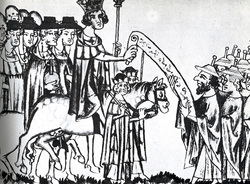Medieval Jewish History
Alanna E. Cooper
Fall 2012
Session 7: Living as Jews among Christians

READINGS FROM THE COURSEPACK
Rosemary Ruether’s essay Anti-Semitism and Christian Theology" was published in 1974 in the edited volume, Auschwitz: Beginning of a New Era? This book grew out of an international symposium of Christian and Jewish thinkers, who gathered to discuss the Holocaust’s theological implications.
It may seem odd that in a course on Medieval Jewish history we turn to a work that addresses the Holocaust. By doing so, we take up Ruether’s invitation to view the seeds of this 20th century horror as having been planted with the Church’s founding, and having sprouted in the middle ages. In class I’ll be interested to hear your thoughts on whether Ruether's angle of analysis is a compelling one. To guide our discussion we read together in class the following primary documents included in the course pack.
Although in class we will not focus on Yosef Yerushalmi’s response to Ruether, I’ve included it in the course pack for those with a particular interest in the matter.
- Please read at home: “Anti-Semitism and Christian Theology,” Rosemary Radford Ruether
- Optional reading: "Response to Rosemary Ruether," Yosef Yerushalmi
- Reading that we will do together in class:
- St. Augustine on the Jews
- Local Charter, Bishop Rudiger of Speyer
- King Louis X Re-admits the Jews
Rosemary Ruether’s essay Anti-Semitism and Christian Theology" was published in 1974 in the edited volume, Auschwitz: Beginning of a New Era? This book grew out of an international symposium of Christian and Jewish thinkers, who gathered to discuss the Holocaust’s theological implications.
It may seem odd that in a course on Medieval Jewish history we turn to a work that addresses the Holocaust. By doing so, we take up Ruether’s invitation to view the seeds of this 20th century horror as having been planted with the Church’s founding, and having sprouted in the middle ages. In class I’ll be interested to hear your thoughts on whether Ruether's angle of analysis is a compelling one. To guide our discussion we read together in class the following primary documents included in the course pack.
- St. Augustine on the Jews
- Local Charter, Bishop Rudiger of Speyer
- King Louis X Re-admits the Jews
Although in class we will not focus on Yosef Yerushalmi’s response to Ruether, I’ve included it in the course pack for those with a particular interest in the matter.
